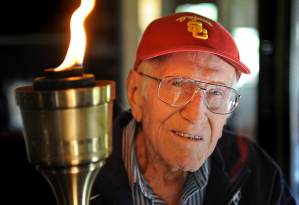
If there was a story where a troubled California child grew up and became an Olympic runner, personally met Adolf Hitler, fought in World War II, survived being stranded at sea for many days with fellow airmen, and suffered unspeakable cruelty in Japanese prisoner-of-war camps, chances are many people would think this story would be a great work of fiction.
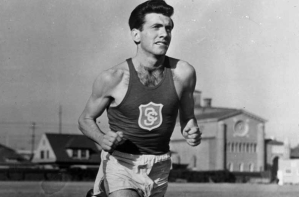
However, that is a rough summation of the very true story of Louis Zamperini, who passed away in July 2014 at the age of 97. Zamperini's daughter, Cynthia Garris, told Townhall that no one today could endure what her father went through and shared his backstory of how he accepted Jesus in his heart.
"He didn't become a Christian until he came home," Garris said, noting that her father was raised Catholic. "So what he did was he noticed that Phil prayed a lot on the raft and what we've been told, is if you've ever been brought to your knees by something that happened to you in your life, that everybody will turn to God when they have no place else to turn."
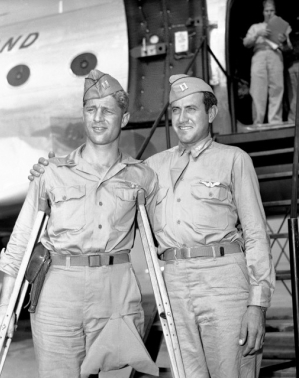
Garris added that although the medical diagnosis did not exist at the time, Zamperini suffered from post-traumatic stress disorder, more commonly known as PTSD. She also said that her father forgot the promise he made to God while stranded out at sea and wanted to seek revenge against Japanese Imperial officer Mutsuhiro Watanabe, who was infamously known as "The Bird."
"The PTSD hit him very hard," Garris said. "Nightmares every single night, he dreamt he was strangling The Bird and that his goal in life, even though he was newlywed, and I was his first child, I was still an infant - his goal in life was to save enough money to go back to Japan, find the Bird and kill him."
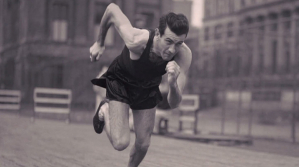
Garris mentioned that her mother was going to leave Zamperini. However, a then-unknown evangelist named Billy Graham came to Los Angeles in 1949 and preached out of a tent, which her mom visited upon advice of family friends.
"My mother went, became a Christian and told my father, 'I'm not going to leave you because I'm now with the Lord, but I want you to come with me.' So he grudgingly went," Garris said.
According to Garris, her father suddenly remembered the promise he made to God back in the life raft during his second visit to the Los Angeles crusade held by Graham. He previously walked out the first time.
"It basically humbled him and he accepted Christ that night," Garris said. "He says all the nightmares stopped - he never had another one for the rest of his life. It just filled his heart with what he needed the most."
Garris also noted the lifestyle changes in her father too after he turned to God for his salvation, which included not using swear words and not drinking alcohol.
"He was a wonderful, dutiful father and husband," Zamperini's daughter said. "It had a powerful impact on him and I just think he needed it so desperately and if you were talking to him right now he'd be able to look back on his whole life and think of all the times he almost died but didn't. From the time he was a little boy, all the way through. He sees it all as a series of miracles."
Garris mentioned that "the hand of God was guiding his life to serve a greater purpose," saying that his Christian faith "was the most important thing to him."
One of the best examples where he put his Christian faith in action was when he eventually forgave the Bird, the man responsible for torturing him in the Japanese POW camps. Garris mentioned that her father's favorite quote was "Hating someone is like drinking poison and expecting the other person to die."
"He was a wonderful role model for us," Garris said. "And my father would actually, he would pray for his enemies, or pray for people who had done wrong to him, and that's a wonderful way to let it out of you. So he taught us that as well."
According to Garris, her father skateboarded in his seventies and also loved mountain climbing, repelling, and whitewater rafting. He also put his faith in action by starting his own boys' camp and doing speaking tours.
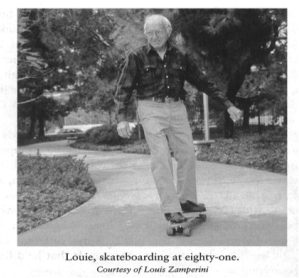
"He wanted to give back and he wanted to help other delinquent boys, because he had been one in his youth and he wanted to deliver the gospel to them by taking them out into the wilderness and showing them how to survive, hunt, fish, mountain climb and present his story of salvation and survival," Garris said. "In his last few years, he loved going and speaking on cruise ships and he had a couple of those boys who had grown up and were there."
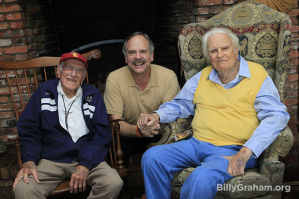
According to Trevor Freeze of the Billy Graham Evangelistic Association, Zamperini had the chance to visit Graham again in 2011 at his home in Montreat, N.C. and held a book signing at age 94 at the Billy Graham Library. Zamerini also teamed up with Graham at several crusades as an inspirational speaker, which included locations in San Francisco (1958) and Los Angeles (1963).
Zamperini's extraordinary life story can be found in Laura Hillenbrand's 2010 book Unbroken: A World War II Story of Survival, Resilience, and Redemption. Angelina Jolie directed a film, which will be released in U.S. theaters on Christmas Day, based on the contents of that book.







